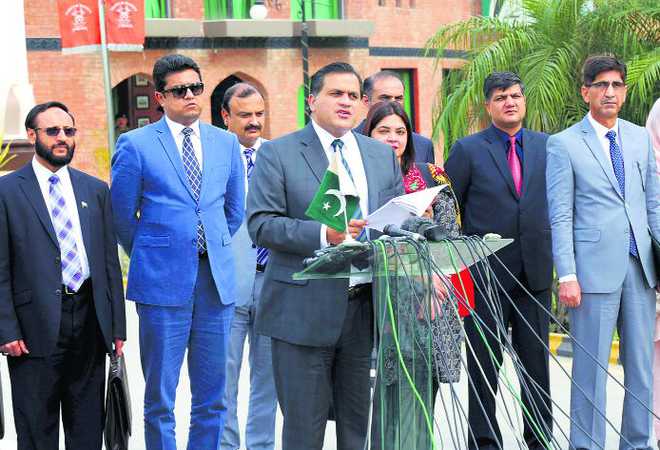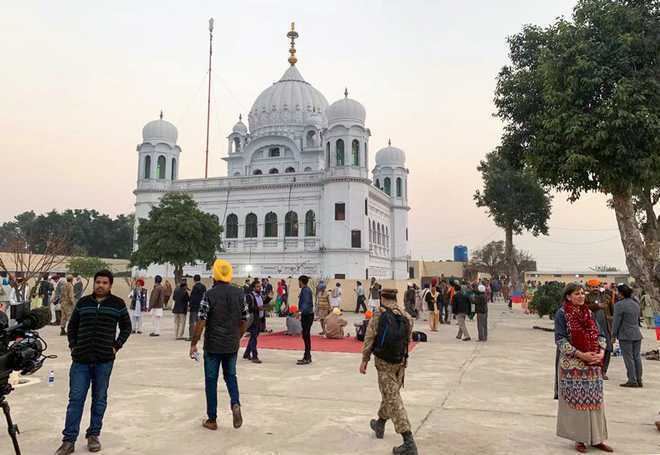Exactly a month after the Pulwama massacre, India and Pakistan have agreed to work towards an expeditious launch of the Kartarpur corridor. The terror attack and its aftermath had threatened to derail the project, but the two countries have commendably delinked it from the ongoing hostilities for the sake of a pious occasion — the upcoming 550th birth anniversary of Guru Nanak. India has stuck to its oft-quoted stand that ‘talks and terror’ cannot go hand in hand, making it clear to the Pakistani delegates that the Attari meeting should not be seen as a ‘resumption of bilateral dialogue’.
Pakistan had initially stated that the proposed corridor would be opened only for Sikh devotees from India, a decision that had exposed the Pak ploy as Sikh places of worship are revered and frequented by Hindus as well. Quick to see through the divisive agenda, India has finally prevailed upon Pakistan to grant access to all Indian citizens, irrespective of their religion. In another positive move on the diplomatic front, India has managed to make the neighbour give the assurance that it would insulate Kartarpur Sahib pilgrims from Khalistani (and anti-India) propaganda. India and the world will watch closely whether Pakistan walks the talk on this contentious matter. Pakistan has repeatedly demonstrated a soft spot for pro-Khalistan terrorists and campaigners. Incidentally, a day before the Attari talks, PM Imran Khan was reported to have met a controversial Sikh leader, who is considered to be a close aide of Jaish-e-Mohammed chief Masood Azhar.
Such developments should make India wary of Pakistan’s intentions. Misuse of the corridor for the radicalisation of devotees or other nefarious designs will defeat its purpose. The possibility that the passage could be used to push in infiltrators might be slim, considering the high security expected all along the route, but it’s not entirely ruled out. The focus should remain on facilitating hassle-free access to the shrine associated with the first Sikh Guru. Mutual trust is a must to ensure that the project sees the light of day.
Decoding Kartarpur


Pravin Sawhney
Strategic Affairs Expert
That religious sentiments will always triumph over policy prejudice is evident from the just-concluded first round of talks on the Kartarpur corridor. The joint statement issued after the talks said both sides had a ‘detailed and constructive discussion’, which will be followed up in the second round at Wagah, where issues flagged by India are likely to be addressed. These include the number and nature of pilgrims per day. India wants that Overseas Citizens of India should also be able to use the corridor.
These are small issues, and it is unlikely that under the present circumstances, Pakistan would make these sticking points, especially when it has completely usurped the peace narrative in the subcontinent, despite the recent history of Pulwama attack. As far as India’s larger concern regarding Pakistan misusing this opportunity to peddle Khalistani propaganda goes, this is in the realm of perception. Frankly, India cannot have any control over this. What happens inside Kartarpur, what kind of people will come there and who will interact with whom is something India will just have to accept for the larger issue of deferring to the long-pending request of the Sikhs.
From India’s perspective, the niggling question is why must Pakistan be so amenable on the Kartarpur corridor? And why did the Pakistan army chief mention this to the visiting Indian politician Navjot Singh Sidhu? After all, Sidhu had gone to Islamabad on the invitation of his long-standing ‘friend’ PM Imran Khan. Wouldn’t it have been more natural for the ‘friend’ to communicate this?These questions betray a total lack of understanding of how the Pakistan government — a first-ever military-political joint venture — has been repositioning itself in the region as a reasonable and responsible power committed to human values. We tend to laugh at this, because our policy-making is held captive by the twin forces of deep-rooted prejudice and manufactured public opinion.
Sample the responses from both sides after the first round of talks. An anonymous Indian source told the media that it was disappointed by Pakistan’s recalcitrant attitude during the talks. Whereas, Pakistan High Commissioner to India Sohail Mahmood told me, ‘Since both governments have shown deference to the wishes of the people, this (corridor) has the potential of transformational effect.’ He accepted that there was ‘lack of trust’ between the two sides, but insisted that a number of positives might help mitigate it. According to him, ‘The release of the Indian pilot, resumption of Samjhauta Express train, return of the cross-LoC trade, weekly contact between the two directors general of military operations, return of the high commissioners to work, and the Kartarpur talks are good for the relationship and people-to-people contact.’
Pakistan’s positivity does not mean that it is anxious for an early meaningful resumption of talks with India. It knows this will not be immediately possible with even the next dispensation in Delhi, which, if different, would need time to re-channel the dislike which has currently shaped the public opinion. Given this, Pakistan could well be working for outside mediation, which India has thus far steadfastly refused, on Kashmir.
The starting point for Pakistan is the raising of its geopolitical profile, pivoted on three milestones: CPEC announced in 2013 as the flagship of China’s Belt and Road Initiative (BRI); Pakistan’s entry into the Shanghai Cooperation Organisation (SCO) in 2017 as a member state; and the installation of the Imran Khan government in 2018 with clearly defined division of work between Islamabad and the general headquarters, Rawalpindi. With these, Pakistan’s importance for the US, China and Russia, three geo-strategic nations with capability, capacity and political will to influence events far away, has increased exponentially.
China needs Pakistan for (a) the success of BRI, (b) entry into the Muslim world by CPEC extensions to Afghanistan, Iran, Saudi Arabia and Central Asian republics, and (c) favourable opinion-building in India’s neighbourhood comprising Bangladesh, Sri Lanka, Nepal, the Maldives and so on, which would ease China’s entry into SAARC. In return, China, through its official newspaper, The Global Times, recently said China’s primary aim in the region ‘is to develop poor and backward Kashmir’.
The US needs Pakistan for (a) extrication of its troops from Afghanistan, (b) ensuring that its N-weapons are not accessible to non-state actors, and (c) to maintain some leverage in the subcontinent, which it has assessed as a nuclear flash point. Russia’s interest in Pakistan, which started in 2001, has become prominent. It believes that by strengthening Pakistan’s counter-terror capabilities it can, through proxy, once again have a role in the post-US Afghan dispensation.
Moreover, the trio of Russia, China and Pakistan is fast emerging as an alternative to US-led security matrix in the Indo-Pacific region. This has been helped by the withdrawal of the US from the Trans-Pacific Partnership without a good substitute which caters to both security and prosperity of regional nation states. This explains Russia’s trade cooperation with Pakistan, with a promise of direct arms trade. While this will be a slow process, Pakistan is likely to get Russian military technology through China.
Unfortunately, India remains oblivious to these dynamics. The predominant narrative of Indian policy-makers, analysts and media is that Pakistan is a failing state, one that is deeply in debt and a hotbed of terrorists. For decades, we have been waiting for Pakistan to implode, but it has been refusing to oblige us.
Coming back to the Kartarpur corridor, one of the strongest elements of Pakistan’s soft power is its human resource — polite, humble and apparently in love with Indians. As Sikh pilgrims visit Kartarpur, Pakistan is likely to unleash this charm on them, gradually building the constituency for meaningful talks with India.

